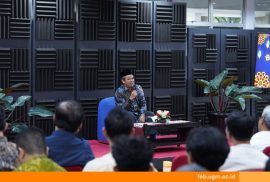The progress of Indonesia’s agricultural sector today cannot be separated from the roles played by the nation’s prominent figures in the past. The Faculty of Economics and Business at Universitas Gadjah Mada (FEB UGM) has also contributed to developing the country’s agricultural sector. Many experts or economists across generations from FEB UGM have played a role in advancing the agricultural industry, one of them being Prof. Mubyarto.
A professor of Economics at FEB UGM, Prof. Dr. Catur Sugiyanto, MA., mentioned that Prof. Mubyarto was a figure who studied the behavior of small farmers in Indonesia, focusing on the rice surplus that could be marketed. Despite their small scale, Mubyarto viewed Indonesian farmers as rational economic actors who acted to sustain their families’ livelihoods.
“Pak Muby’s thoughts are closely related to the green revolution efforts to increase farmers’ productivity through intensification policies such as BIMAS and INMAS,” he said during his scientific oration titled A Brief Anthology of FEB UGM Economists’ Thoughts in the Development of Indonesia’s Agricultural Sector on Thursday (19/9) at the 69th FEBE UGM Open Senate Meeting in celebration of FEB UGM’s anniversary, held in the 8th-floor Learning Building at FEB UGM.
Other economists, such as Prof. Gunawan Sumodiningrat, M.Ec later complemented Prof. Mubyarto’s ideas. Sumodiningrat and Pitt studied the influence of risk and profitability on farmers’ adoption of superior varieties. They found that risk factors, access to credit, and irrigation quality were key in farmers’ decisions to adopt agricultural technology. Sumodiningrat’s analysis complemented Mubyarto’s view by adding dimensions of risk and economic profitability as critical factors in farmers’ decision-making. This is also relevant to government programs encouraging agricultural technology adoption through BIMAS, where credit and the availability of technology greatly influenced farmers’ decisions.
In his oration, Prof. Catur also discussed the research findings of other economists, such as Dr. Soetatwo Hadiwigeno, who emphasized the importance of irrigation infrastructure and credit for farmers, primarily through the BIMAS program, in increasing farmers’ income. Soetatwo also highlighted the significant role of irrigation infrastructure in adopting agricultural technology. Hadiwigeno’s research directly connects to Sumodiningrat’s thoughts on the importance of credit and Prabowo’s ideas on water availability so farmers can adopt new technologies. Additionally, his views complement Timmer’s thoughts on the government’s role and BULOG in supporting farmers in accessing necessary resources.
Catur added that other FEB UGM economists’ thoughts on agriculture also came from Dr. Budiono Sri Handoko, M.A., who used neoclassical regression to evaluate agricultural input use efficiency, primarily related to new technologies such as superior seeds. He found that farmers with larger land areas tended to adopt new technology more quickly, and there were structural differences in input demand patterns based on the scale of farming.
“Pak Bud’s findings reinforce Sumodiningrat and Mubyarto’s view that larger farmers have an advantage in adopting technology, while small farmers are more sensitive to risks and input prices. These thoughts align with agricultural credit policies that aim to expand access for small farmers so they can increase productivity through new technology,” he explained.
Catur said that economist Dr. Bagus Santoso, M.Soc.Sc., also found that after achieving rice self-sufficiency in 1984, national rice productivity declined. This was related to changes in farmers’ behavior, who began to reduce the use of superior seeds after output prices rose. Santosa’s findings highlight the need for more sustainable policies after achieving self-sufficiency.
“In conclusion, a strong common thread is running through these various studies. They all highlight the importance of the interaction between policies, technology, risk, and economic incentives in the success of agricultural development in Indonesia,” he explained.
At the end of his speech, Catur noted that the Green Revolution brought significant changes. However, long-term success depends on proper risk management, credit access, infrastructure, and price stability. Criticisms of over-reliance on rice and focus on Java suggest the need for diversification and a more inclusive approach to ensure future food security.
These FEB UGM economists have significantly contributed to various policies and research supporting national agricultural development. Their thoughts remain relevant in addressing long-term challenges in the agricultural sector, particularly regarding price stability, credit access, technology, and more inclusive agrarian diversification.
Reportage: Kurnia Ekaptiningrum
Watch the vull video at https://youtu.be/n_fzu7_IIFA
Sustainable Development Goals









